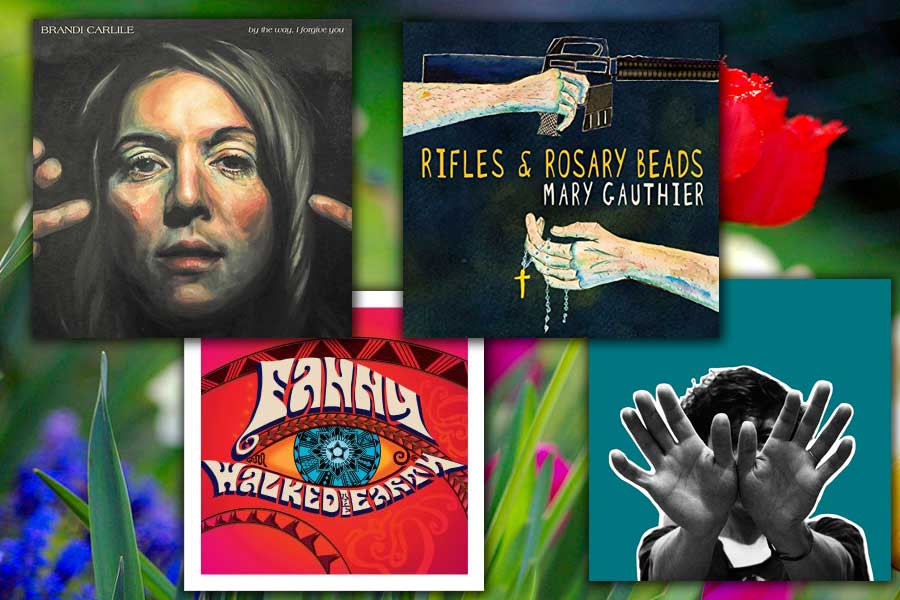Brandi Carlile
“By the Way, I Forgive You”
Low Country Sound / Elektra
Carlile’s latest album is a moody affair populated with doomed addicts and exasperated lovers. As she sings on “Harder to Forgive,” “I don’t always choose to stay on the sunny side.” But that song ends with a rousing crescendo, hinting at a glimmer of hope found in these 10 songs. Even “Sugartooth,” the record’s darkest track, expresses genuine empathy for a troubled soul.
In contrast, “The Joke,” which is the lead single, offers plainspoken encouragement to kids who are different. “I saw your eyes behind your hair, and you’re looking tired, but you don’t look scared,” Carlile sings.
Her country-tinged voice fits well with the music’s Americana vibe, and when she lets loose like she does on the chorus of “Hold Out Your Hand,” the result is rousing.

The record includes two thoughtful ruminations on parenthood, “Most of All” and “The Mother.” On the latter, Carlile notes of her daughter, “The first things that she took from me were selfishness and sleep.” Her point being: It was worth it.
Lucy Dacus
“Historian”
Matador Records
www.lucydacus.com
Unexpected turns of phrase and touches of dark humor elevate this variation on indie rock. “Night Shift,” the opening track, begins with the startling lines: “The first time I tasted somebody else’s spit, I had a coughing fit.” It’s a breakup song, and as the guitars get louder and louder, Dacus repeats, “You’ve got a nine-to-five, so I’ll take the night shift, and I’ll never see you again, if I can help it.”
Soft/loud dynamics are a familiar indie technique that Dacus skillfully employs, but some songs are embellished with strings or horns. She’s also unafraid to venture beyond the genre. “Yours & Mine,” with its bluesy tone, brings out the soulful side of her contralto. “Me and mine, (me and mine), we’ve got a long way to go, before we get home,” she sings.
Dacus also blithely ignores consistency. “Nonbeliever” is about losing one’s faith, among other things, but “Pillar of Truth,” a poignant song about a loved one’s impending death, unapologetically invokes the Lord.
Mary Gauthier
“Rifles & Rosary Beads”
In the Black Records
www.marygauthier.com
Every song on this moving record was cowritten with wounded veterans or their family members. Together, they offer a candid glimpse of military service and its aftermath.
The music is generally spare: acoustic guitar, mandolin or fiddle. And Gauthier’s conversational singing voice lets the lyrics convey the emotions.
The songs cover topics ranging from the stress of combat to survivor’s guilt. “Soldiering On,” the opener, sets the tone. A veteran accustomed to shutting down his emotions in combat struggles to readjust to civilian life. “But what saves you in the battle, can kill you at home,” Gauthier sings. “The War After the War” is about military wives whose husbands return home utterly broken. “I get no basic training, I get no Purple Heart,” the singer ruefully notes.
Unfortunately, women in uniform fight battles on multiple fronts. The chorus of “Iraq,” about an army mechanic who’s sexually assaulted by fellow soldiers, somberly concludes, “And it was so hard to see, until it attacked, but my enemy, wasn’t Iraq.”
Fanny Walked the Earth
“Fanny Walked the Earth”
Blue Élan Records
www.facebook.com/FannyWalkedTheEarth
A classic rock vibe suffuses this record, which is fitting. After all, Fanny was one of the first all-female rock bands, issuing a handful of albums in the early 1970s. This release, the band’s first in decades, reunites core members Brie Darling (drums), June Millington (guitar), and Jean Millington Adamian (bass).
These 60-somethings sure do rock. The opener, “Lured Away,” puts listeners on notice: “It’s fuckin’ scary. I kinda like this!” Darling sings. “When We Need Her,” an invocation of female spirit, has great harmonies and features guest vocals from Cherie Currie of the Runaways and Susanna Hoffs of The Bangles.
Female empowerment is a common theme, whether it’s the lighthearted party song “Girls on the Road,” about starting a band when you’re just 17, or “Cool Girl,” with its handclaps and funky middle section. As Darling sings, “You know anyone can say they’re gonna be somebody. You already are.”
Throughout, Darling and Adamian lock into a tight groove, and Millington’s tasty guitar solos propel the songs forward.
Tune-Yards
“I Can Feel You Creep Into My Private Life”
4AD Records
www.tune-yards.com
On Tune-Yards’ fourth release, Merrill Garbus continues her exploration of rhythm. As the handclaps and programmed drums signal, this is dance music — but as the snappy single “ABC 123” demonstrates, her approach is cerebral and slightly off-kilter.
Most of the album’s 12 songs are political, either obliquely or directly. On the opener, “Heart Attack,” Garbus unleashes her powerful contralto two-thirds of the way in: “Oh, it’s giving me a heart attack-ack-ack. Don’t let me lose my soul!” And on “Coast to Coast,” she mentions right and left before singing, “See you in the middle, when the walls come tumbling down to the sea.”
“Colonizer” is especially interesting. Garbus is well-known for incorporating black musical genres like Afrobeat and Haitian drumming into her music. When she sings, “I use my white woman’s voice to tell stories of travels with African men,” she’s acknowledging her white privilege and pushing herself.
Nate Brenner’s bass playing is excellent, adding a woozy dub feel to songs like “Home” and distorted fuzz on “Free.” n
